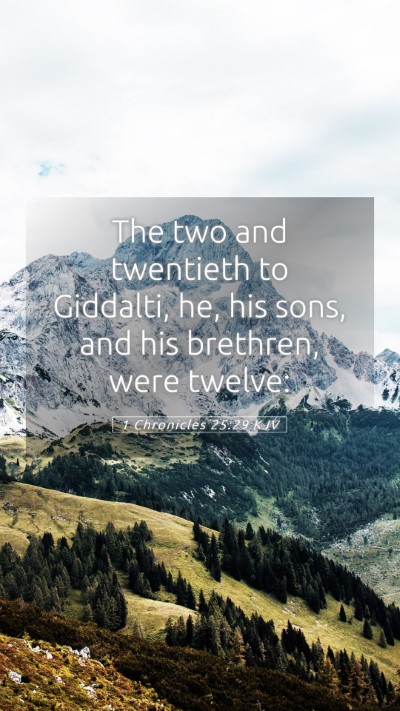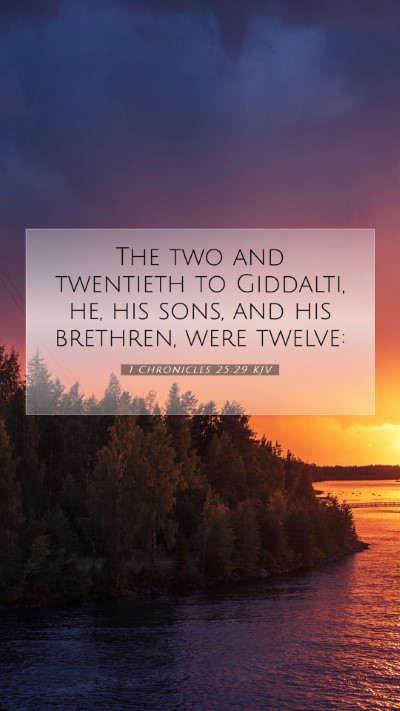Understanding 1 Chronicles 25:29
This verse highlights the organization and purpose of the Levitical singers and musicians in the temple. It serves as a reminder of the importance of worship in the life of the Israelite community.
Bible Verse
“The son of Abijah; the son of the sons of Asaph.” (1 Chronicles 25:29)
Bible Verse Meaning and Commentary
The significance of this verse can be understood better when placed within the historical context of King David's establishment of temple worship.
-
Contextual Background:
King David, as recorded in the chapters leading up to 1 Chronicles 25, organized the Levites into various divisions for the service of the temple. The focus on musical worship reflects the importance of praise in the Israelite tradition.
-
Significance of Musical Ministry:
Worship through music has always held a vital role in the community, serving as a means of expressing devotion and helping the people connect with God.
-
Spiritual Leadership:
This verse underlines the lineage of Asaph, a significant figure in the psalms, indicating the continuity of spiritual leadership through generations.
Insights from Public Domain Commentaries
Matthew Henry: He emphasizes the structured approach to worship that David instituted, noting the delegated roles of each musician and the importance of their lineage. Henry believes that God is pleased when His people come together to worship with purpose and harmony.
Albert Barnes: Barnes focuses on the role of the descendants of Asaph, highlighting their important contributions to the worship life of Israel. He suggests that the continuation of these families in worship practices is a testament to God's faithfulness to the covenant.
Adam Clarke: In his commentary, Clarke provides insights on the historical significance of the Levitical singers. He points out that these musicians were chosen specifically for their skill and dedication, reflecting the value of excellence in worship.
Application for Today
In contemporary Christianity, this verse inspires an understanding of the importance of organized worship and the roles that individuals play in contributing to a community's spiritual atmosphere.
-
Worship and Community:
Just as the Levites were organized for service, modern churches benefit from structured ministries that allow for varied gifts and talents to be utilized in worship.
-
Musical Worship:
The role of music remains vital, encouraging believers to engage in heartfelt worship that honors God.
Cross References
- 1 Chronicles 6:31–48 - Details on the Levitical musicians and their roles.
- Psalm 78:70-72 - Refers to David's role as a shepherd leader in Israel.
- 2 Chronicles 29:25 - King Hezekiah's restoration of temple worship with Levites and singers.
Conclusion
1 Chronicles 25:29 serves as a poignant reminder of the heritage and responsibility in worship—encouraging us to consider how we contribute to the spiritual life of our communities today. The insights gleaned from this text can be valuable for any Bible study group or personal study, aiding in deeper understanding of Scripture and the significance of worship in both ancient and modern contexts.


